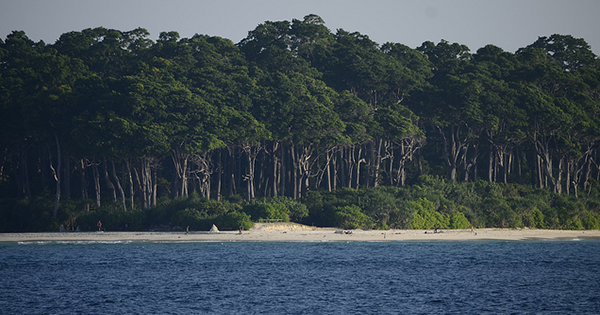The Last Island of the Savages
Journeying to the Andaman Islands to meet the most isolated tribe on Earth

The lumps of white coral shone round the dark mound like a chaplet of bleached skulls, and everything around was so quiet that when I stood still all sound and all movement in the world seemed to come to an end. It was a great peace, as if the earth had been one grave, and for a time I stood there thinking mostly of the living who, buried in remote places out of the knowledge of mankind, still are fated to share in its tragic or grotesque miseries. In its noble struggles too—who knows? The human heart is vast enough to contain all the world. It is valiant enough to bear the burden, but where is the courage that would cast it off?
—Joseph Conrad, Lord Jim
Shortly before midnight on August 2, 1981, a Panamanian-registered freighter called the Primrose, which was traveling in heavy seas between Bangladesh and Australia with a cargo of poultry feed, ran aground on a coral reef in the Bay of Bengal. As dawn broke the next morning, the captain was probably relieved to see dry land just a few hundred yards from the Primrose’s resting place: a low-lying island, several miles across, with a narrow beach of clean white sand giving way to dense jungle. If he consulted his charts, he realized that this was North Sentinel Island, a western outlier in the Andaman archipelago, which belongs to India and stretches in a ragged line between Burma and Sumatra. But the sea was too rough to lower the lifeboats, and so—since the ship seemed to be in no danger of sinking—the captain decided to keep his crew on board and wait for help to arrive.
A few days later, a young sailor on lookout duty in the Primrose’s Watchtower spotted several people coming down from the forest toward the beach and peering out at the stranded vessel. They must be a rescue party sent by the shipping company, he thought. Then he took a closer look at them. They were small men, well-built, frizzy-haired, and black. They were naked except for narrow belts that circled their waists. And they were holding spears, bows, and arrows, which they had begun waving in a manner that seemed not altogether friendly.
Not long after this, a wireless operator at the Regent Shipping Company’s offices in Hong Kong received an urgent distress call from the Primrose’s captain, asking for an immediate airdrop of firearms so that his Island crew could defend itself. “Wild men, estimate more than 50, carrying various homemade weapons are making two or three wooden boats,” the message read. “Worrying they will board us at sunset. All crew members’ lives not guaranteed.”
If the Primrose’s predicament seemed a thing less of the twentieth century than of the eighteenth—an episode, perhaps, from Captain Cook’s voyages in the Pacific—it is because the island where the ship lay grounded had somehow managed to slip through the net of history. Although its existence had been known for centuries, its inhabitants had had virtually no contact with the rest of humanity. Anthropologists referred to them as “Sentinelese,” but no one knew what they called themselves—indeed, no one even knew what language they spoke. And in any case, no one within living memory had gotten close enough to ask. Whether the natives’ prelapsarian state was one of savagery or innocence, no one knew either.
The same monsoon-whipped waves that had driven the Primrose onto the reef kept the tribesmen’s canoes at bay, and high winds blew their arrows off the mark. The crew kept up a twenty-four-hour guard with makeshift weapons—a flare gun, axes, some lengths of pipe—as news of the emergency slowly filtered to the outside world. (An Indian government spokesman denied reports in the Hong Kong press that the Sentinelese were “cannibals.” A Hong Kong government spokesman suggested that perhaps the Primrose’s radio officer had “gone bananas.”) After nearly a week, the Indian Navy dispatched a tugboat and a helicopter to rescue the besieged sailors.
The natives of North Sentinel must have watched the whirring aircraft as it hovered three times above the great steel hulk, lowering a rope ladder to pluck the men safely back into modernity. Then the strange machines departed, the sea calmed, and the island remained, lush and impenetrable, still waiting for its Cook or its Columbus.
Login to view the full article
Need to register?
Already a subscriber through The American Scholar?
Are you a Phi Beta Kappa sustaining member?
Register here
Want to subscribe?
Print subscribers get access to our entire website Subscribe here
You can also just subscribe to our website for $9.99. Subscribe here
true



